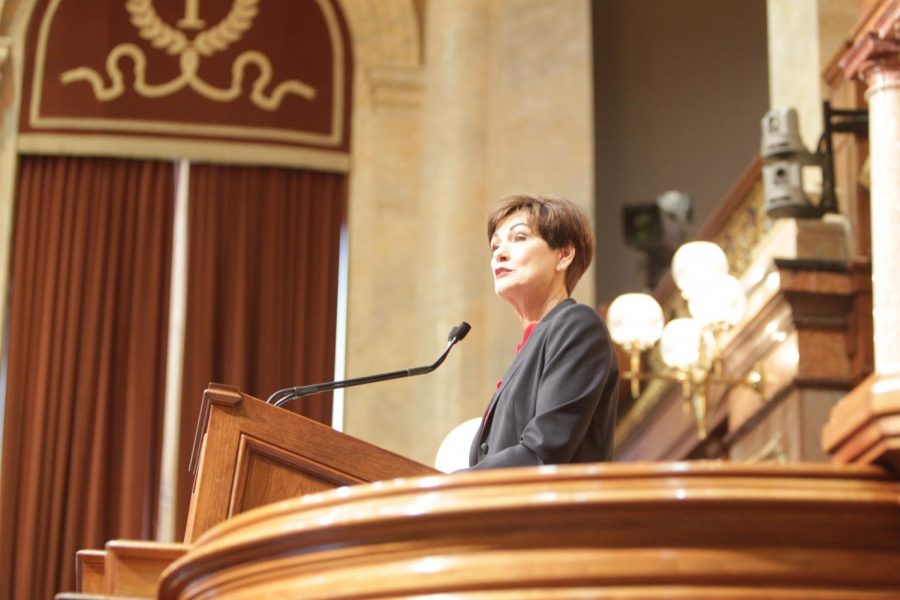McComas: Iowa struggles over fetal-heartbeat bill
While an Iowa abortion law is being bounced back and forth between the judiciary and legislature, Gov. Reynolds proposes productive measures.
Iowa Gov. Kim Reynolds delivers her Condition of the State address in the House chamber of the State Capitol Building in Des Moines on Jan. 15, 2019. In the address, her first as an elected governor, she largely outlined bipartisan initiatives which have received widespread support.
March 5, 2019
The Iowa Legislature has made a continuous effort to limit abortion rights since the 2016 election, and thankfully, the Iowa judicial system — and more than anything, Iowa’s constitutional precedent — has upheld the necessary fight for women’s reproductive rights. An Iowa judge struck down the fetal-heartbeat law, a strict statewide regulation on abortion rights, this past January.
The striking down of the fetal-heartbeat law should be seen as a statewide victory for women’s rights, because the law had the strictest reproduction regulations in the country. The court’s decision to strike down the law exhibits the balance of power in the State Capitol and the ability of the Iowa judiciary to protect Iowans’ rights when the Legislature infringes on them.
RELATED: Iowa Gov. Kim Reynolds won’t appeal ruling striking down fetal-heartbeat bill
President Trump’s leadership and rising conservative influence since the 2016 election has stimulated a re-established movement for pro-life legislation. In Iowa especially, we have seen a strong push toward anti-abortion policy, which has undermined the achievements of local women’s-rights movements across the Hawkeye State.
Many anti-abortion activists seek to modify the judicial-selection process and even amend Iowa’s Constitution to carry out the radical abortion regulations. The Iowa Senate State Government Committee approved a resolution Tuesday to insert language into the state Constitution explicitly stating that it does not protect the right to an abortion. These proposals are counterproductive because of the precedent that the Iowa courts have established to protect women’s rights to their own bodies.
RELATED: Supreme Court removes 72-hour waiting period from fetal-heartbeat law
Regardless of Iowa’s recent pro-life legislation initiatives, the state government has upheld its longstanding morals supporting Iowa women. Even Gov. Kim Reynolds, who backed the fetal-heartbeat bill, has decided against appealing the judge’s decision to strike it down. Just like the federal government, Iowa enforces the separation of powers, and Reynolds is aware of the difficulty of undoing judicial decisions. Other pro-life activists across the state may not be fully aware of the organization of Iowa’s central government.
RELATED: Polk County judge rules Iowa’s fetal-heartbeat law unconstitutional
To propose bills that give fetuses equal constitutional rights and defund sex-education resources is institutionally irrational and counterproductive. Putting the same effort into legislation that would improve lives outside the womb could lead to a decrease in the number of abortions in Iowa. Plausible political initiatives such as boosting welfare programs to benefit newborns born in underprivileged or impoverished homes could produce results that support the goals of the pro-life community. The funding of sex education and increased access to contraceptive options can also result in fewer abortions across the state.
It is also important to find common ground in such sensitive areas of policy. In February, Reynolds addressed her proposal to increase access to birth control and she noted that her legislation would allow adults the access to “behind-the-counter” birth-control options without a prescription. State legislation such as this policy initiative that both parties can back and would ultimately benefit both pro-life and pro-choice Iowans.






